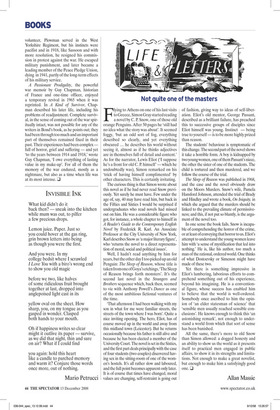Not quite one of the masters
Flying to Athens on one of his last visits to Greece, Simon Gray started reading a novel by C. P. Snow, one of those old orange Penguins. After 50 pages he ‘still had no idea what the story was about’. It seemed foggy, ‘but an odd sort of fog, everything described so clearly, and yet everything obscured ... he describes his world without seeing it, almost as if he thinks adjectives are in themselves full of detail and content.’ As for the narrator, Lewis Eliot (‘I suppose he’s a front for old C. P. himself’ — which he undoubtedly was), Simon remarked on his ‘trick of having himself complimented’ by other characters. This is certainly irritating.
The curious thing is that Simon wrote about this novel as if he had never read Snow previously. Yet surely he must have. Few under the age of, say, 40 may have read him, but back in the Fifties and Sixties I would be surprised if undergraduates who read novels had missed out on him. He was a considerable figure who got, for instance, a whole chapter to himself in A Reader’s Guide to the Contemporary English Novel by Frederick R. Karl. An Associate Professor at the City University of New York, Karl describes Snow as ‘a major literary figure’, who ‘returns the novel to a direct representation of moral, social and political issues’.
Well, I hadn’t read anything by him for years, but the other day I too picked up an old Penguin: The Sleep of Reason, whose title is taken from one of Goya’s etchings, ‘The Sleep of Reason brings forth monsters’. It’s the second last novel in the Strangers and Brothers sequence which, back then, seemed to vie with Anthony Powell’s Dance as one of the most ambitious fictional ventures of the time.
‘That afternoon I had been walking with my son in what for me were familiar streets, the streets of the town where I was born’. Quite a nice inviting opening. The hero, Eliot, has of course moved up in the world and away from this midland town (Leicester). But he returns occasionally because his father is still alive and because he has been elected a member of the University Court. The novel is set in the Sixties, and the first part deals principally with the case of four students (two couples) discovered having sex in the sitting-room of one of the women’s hostels. It’s all rather slow and laboured, and the full point becomes apparent only later. It is of course that times have changed, moral values are changing, self-restraint is going out of fashion, giving way to ideas of self-liberation. Eliot’s old mentor, George Passant, described as a brilliant failure, has preached this to successive groups of disciples since Eliot himself was young. Instinct — being true to yourself — is to be more highly prized than reason.
The students’ behaviour is symptomatic of this change. The second part of the novel shows it take a horrible form. A boy is kidnapped by two young women, one of them Passant’s niece, the other the sister of one of the students. The child is tortured and then murdered, and we follow the course of the trial.
The Sleep of Reason was published in 1968, and the case and the novel obviously draw on the Moors Murders. Snow’s wife, Pamela Hansford Johnson, attended the trial of Brady and Hindley and wrote a book, On Iniquity, in which she argued that the murders should be linked to the prevailing climate of permissiveness; and this, if not put so bluntly, is the argument of the novel too.
In one sense the book fails. Snow is incapable of comprehending the horror of the crime, or at least of conveying that horror to us. Eliot’s attempt to understand the young women leave him with ‘a sense of mystification that led into nothing.’ He is, like his author, too much a man of the rational, ordered world. One thinks of what Dostoevsky or Simenon might have made of these two.
Yet there is something impressive in Eliot’s lumbering, laborious efforts to comprehend something out of his experience, beyond his imagining. He is a conventional figure, whose success has enabled him to believe that the world is well-ordered. Somebody once ascribed to him the opinion of ‘an elder statesman of science’ that ‘sensible men usually reached sensible conclusions’. He knows enough to think this ‘an astonishing remark’, not enough to understand a world from which that sort of sense has been banished.
All the same, there’s more to old Snow than Simon allowed: a dogged honesty and an ability to show us the world as it presents itself to practical men engaged in public affairs, to show it in its strengths and limitations. Not enough to make a great novelist, but enough to make him a satisfyingly good one. ❑
Allan Massie










































































 Previous page
Previous page